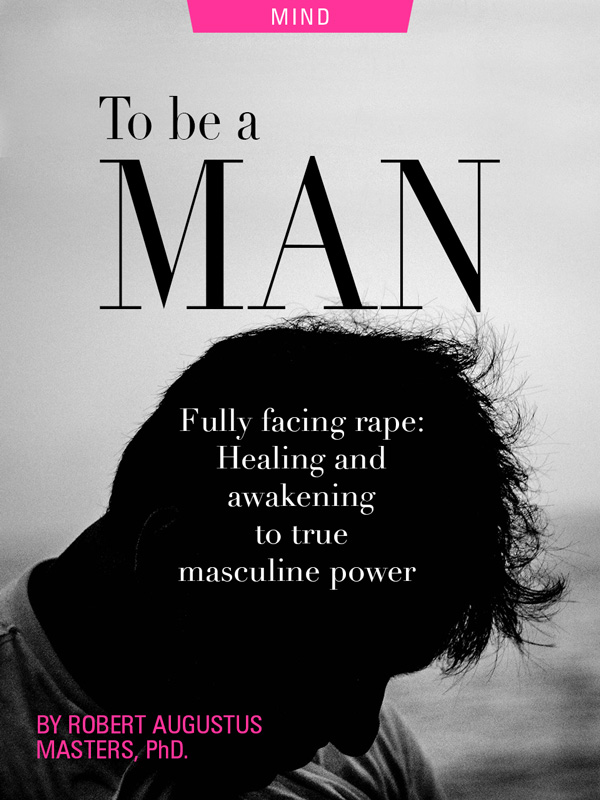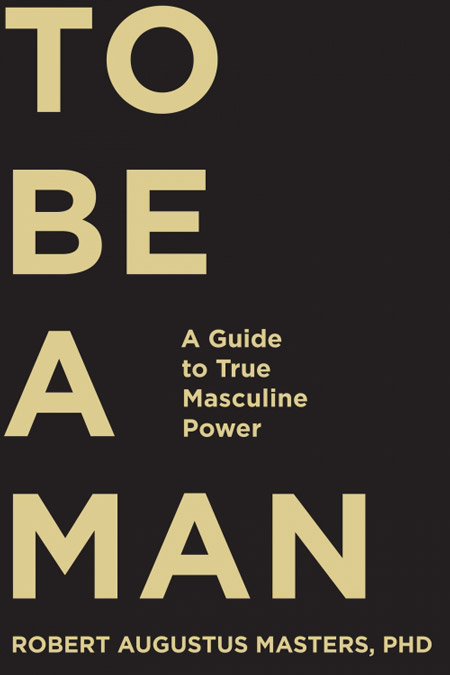
Redefining true masculine power opens the floodgates to healing men and society as a whole
—
When the floodgate of sexual harassment and rape allegations against powerful men in media and politics opened this past Fall 2017, it sparked a long overdue national conversation about male sexual misconduct. With the #MeToo movement now maturing, it’s also time to discuss how men can move beyond cultural notions of manliness, and heal and awaken to true masculine power.
Being truly a man is not such a simple matter. It is not so much a successful meeting of cultural standards and expectations as it is an integrity-generating, compassion-deepening outgrowing of them, an open-eyed, fully embodied passage through the very patterns and expectations that underlie and generate each culture’s — and subculture’s — notions of manliness. Far too often, manhood gets reduced to obedience to a group ethic, in order to be “one of the boys” (an unwittingly telling phrase). Such initiations, whatever their defining rituals, can dumb men so far down that it looks like up to them, especially when their behavior snares the rest of the group’s approval. When sex is reduced to a display of power or a sign that one is indeed a man, all involved are impoverished, and whatever underlies such “prowess” is left unexamined.
All the pressure and shame of trying to be a certain kind of man, all the anxiety and tension that can go with that, often can be briefly but potently eased very quickly through sex. And so too can the sense of not having much power, or of not being very important. So whatever feeds men’s sexual appetite, whatever amplifies it, whatever keeps it front and central, can easily take on an exaggerated emphasis, as is so lavishly illustrated by our culture’s sexual obsession. How easy it is to burden sex with the obligation to make us feel better or more secure or more manly!
Historical View of Rape
One of the biggest problems with rape is that throughout human history it has been sanctioned and tolerated in a variety of contexts, with such an okaying influencing contemporary takes on rape, numbing many to the bare reality of it. The echo of this okaying, this legitimizing of or noninterference with sexual violence, may be faint but it persists.
Consider, for starters, the reputed practice of jus primae noctis (Latin for “right of the first night”) by which a member of the nobility could take a woman on her wedding night and bed her, no matter how opposed she was to this, while the groom could do nothing to stop this. (The earliest mention of this practice is found in the epic of Gilgamesh.) Though there is some debate about whether this practice (also known as droit du seigneur, meaning “right of the lord”) was actually exercised, kings and feudal nobles certainly had the power to enforce it, and not just on wedding nights, given that the men beneath them were little more than indentured servants, whose property — including their wives — could be taken from them at almost any time.
Also consider that, up until not so long ago, a married man had the right to have sex when he wanted it from his wife, no matter how opposed she was to this; marital rape was not called rape for a very long time, regardless of its severity. And consider wartime rape, which has a history as long as that of war itself, and still happens to this day, getting headlines but little countering action. In war, the raping of enemy women has been viewed — and often still is — as a male right.
It’s estimated that almost one in five women (and just under 2 percent of men) in the US have been raped or otherwise sexually assaulted.
Fewer than half the victims report this, and only 3 percent of the perpetrators are convicted. In more than half of the US states, rapists who have impregnated their victims can sue for custody and visitation rights. In the US, 15 percent of sexual assault and rape victims are under the age twelve. These are appalling numbers, and need more than just a skimming over.
Rape as a man’s right: this sentiment still finds some degree of legitimacy not only in the context of spoils of war, but also in those men for whom the sexualized overpowering of another is a turn-on, especially when they’re able to dehumanize that other, reducing her — or him — to little more than a prop (or mere property) in their sexual fantasies and actions. The not uncommon hesitation of many men in positions of considerable power to take really strong stands regarding rape only contributes to the viewing of rape as something bad, but not that bad.
When a man feels overpowered by a woman (in the sense that her mere presence strongly arouses him), he may not feel good about this if she shows no sexual interest in him, perhaps not even noticing him. If he’s (1) sufficiently bothered by her “ability” to so easily turn him on, and (2) makes her responsible for his arousal, “bringing out the beast in him” as she has done (however unknowingly), he may fantasize about “pouncing on her” (after all, what else is a beast to do?), thereby entering, however passively, into the retributive logic and eroticized violence that’s central to rape. He may never act this out with a flesh-and-blood woman, perhaps limiting himself to using pornography in which women are “punished” or “put in their place” — hurt and debased — for their sexual allure. But in this he is, unwittingly or not, contextually aligned with rape, tending to relate to a woman’s body as a site of conquest, a place to “prove” himself.
The Issue of Consent
The lack of consent central to rape doesn’t have to be overtly expressed to be real. The absence of any apparent opposition does not necessarily mean consent. That is, being unable to say no doesn’t necessarily mean saying yes. And even saying yes doesn’t always mean yes; many only say yes because they fear the consequences of saying no, a fear that may date back to their early years, when any sign of noncompliance was met with aggression, censure, crippling shame, or a withdrawal of love.
Part of the problem here is that the whole notion of consent usually gets only a superficial look, featuring an unquestioning acceptance of another’s yes, as if that yes were undoubtedly an adult yes uninfluenced by one’s past, a yes that, of course, should be taken literally. The myth of consenting adults is prevalent in contemporary culture, all too often taken at face value, as if those engaged in such a “contract” were doing so as real adults. However, the very consent given may be coming not from a grown-up place in us, but from a place of unresolved woundedness so that we may be speaking more as adulterated children than as actual adults.
This means that we need to know not only where we’re coming from when we agree to something but also where the other is coming from when he or she makes such an agreement. Implicit in this is some degree of self-knowledge in both parties, along with an obvious transparency. Furthermore, being clear about where we’re coming from includes being out-front about our motivations, including that of wanting the other to say yes — and perhaps wanting to go ahead even if that yes feels partial, reluctant, or artificial to us. If we’re being run by our sexual appetite, our caring about possibly disrespecting the other’s actual boundaries will matter little to us; after all, they’ve said yes, so why not proceed?
Rape is a crossing of another’s sexual boundaries without their permission — or with their coerced permission. It is an eroticized trespassing and violation of their being. Its tools are various combinations of physical force, threat, coercion, abuse of authority, manipulation, and a capacity to shut off empathy and override conscience. Rape features aggression and lust in a darkly compelling embrace, being allowed to possess and run one, in contexts ranging from the mundane to the evil.
The Journey to Healing
To begin to heal is to see what’s fragmented in you, compartmentalized, pushed away, or kept in the shadows — and to approach it not with missionary zeal or quick-fix ambitions, but with patience and compassion.
Healing doesn’t necessarily mean curing. It’s not a matter of getting rid of your endarkened or less-than-healthy qualities — as if excising a tumor — but of openly facing, exploring, and making as wise as possible use of them. This is the essence of self-acceptance. Nothing gets left out. Everything has its place. The deeper your healing, the more you become whole, and the more capable of relating skillfully to everything that you are.
True masculine power happens when courage, integrity, vulnerability, compassion, awareness, and the capacity to take strong action are all functioning together. Such power is potent but not aggressive, challenging but not shaming, grounded but not rigid, forceful but not pushy. It requires head, heart, and guts in full-blooded alignment.
You may also enjoy Interview: Lewis Howes | Redefining Masculinity with Kristen Noel
